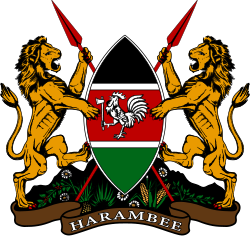| ||||||||||||||||||||||||||||||||||||||||||||||||||||||||||||
Presidential election | ||||||||||||||||||||||||||||||||||||||||||||||||||||||||||||
| ||||||||||||||||||||||||||||||||||||||||||||||||||||||||||||
 Results by province | ||||||||||||||||||||||||||||||||||||||||||||||||||||||||||||
| ||||||||||||||||||||||||||||||||||||||||||||||||||||||||||||
This lists parties that won seats. See the complete results below.
| ||||||||||||||||||||||||||||||||||||||||||||||||||||||||||||
 |
|---|
General elections were held in Kenya on 29 December 1997 to elect the President and the members of the National Assembly. The result was a victory for the ruling Kenya African National Union, which won 107 of the 210 seats in the National Assembly, and whose candidate Daniel arap Moi won the presidential election. Following the election, Moi appointed a further 12 members to the Assembly. [1]





